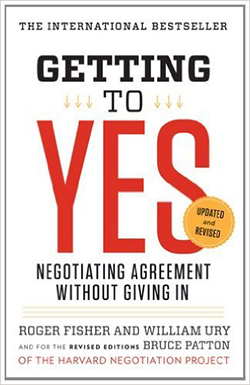Want to be a better negotiator? Read this book.
Using four powerful principles, Getting to Yes will teach you how to broker an argument without things getting ugly


A free daily email with the biggest news stories of the day – and the best features from TheWeek.com
You are now subscribed
Your newsletter sign-up was successful
Negotiation is something we will all encounter in life. But many of us don't know how to negotiate well.
Negotiating is often fraught with emotions. It involves power and uncertainty, and one's argument can often be clouded by pride. It often seems like a zero-sum power struggle where the game is about cheating and arm-twisting.

It doesn't have to be this way. It's possible to learn to negotiate well, and it doesn't have to be a power struggle. Getting to Yes: Negotiating Agreement Without Giving In, is the best book I've read on this topic. It's a business classic that has spent a lot of time on the business bestseller lists. You should read it.
The Week
Escape your echo chamber. Get the facts behind the news, plus analysis from multiple perspectives.

Sign up for The Week's Free Newsletters
From our morning news briefing to a weekly Good News Newsletter, get the best of The Week delivered directly to your inbox.
From our morning news briefing to a weekly Good News Newsletter, get the best of The Week delivered directly to your inbox.
The book is drawn from something called the Harvard Negotiation Project, a systematic study of negotiation done at Harvard Business School. It's based on a few simple, but powerful, principles:
1. Separate people from the problem
Negotiation can get emotional. Our identities get bound up into pride games. We don't want to give in because it would make us feel like losers. But to negotiate properly, we have to face the problem, not the individual person we're up against. Here's how the authors describe this:
If negotiators view themselves as adversaries in a personal face-to-face confrontation, it is difficult to separate their relationship from the substantive problem. In that context, anything one negotiator says about the problem seems to be directed personally at the other and is received that way. Each side tends to become defensive and reactive and to ignore the other side's legitimate interests altogether. ... However difficult personal relations may be between us, you and I become better able to reach an amicable reconciliation of our various interests when we accept that task as a shared problem and face it jointly. [Getting to Yes]
2. Focus on interests, not positions
A free daily email with the biggest news stories of the day – and the best features from TheWeek.com
In other words, ask yourself not just what your opponent wants, but why they want it. Identifying one another's interests, what's really at the root of your arguments, makes it easier to find a solution that benefits both of you.
Let's say I want to sell a car for $10,000, you want to buy it for $5,000, and we haggle over price. This sort of negotiation often ends up being about power and brinkmanship. But maybe I'm selling the car not just because I want cash, but because I need to pay for my grandmother's healthcare. Maybe if you give me $7,000 and promise to drive her to the hospital, we can have a deal.
3. Invent options for mutual gain
Both of you can win if you're open to considering alternative options. The problem is that most people don't spend enough time brainstorming other solutions before they decide an argument is hopeless. Let's say I want to rent the house for $1,000, but you don't have that much money; that's a dead end. But maybe you're a very skilled craftsman and you can pay $500 and make up for the missing cash by working on the house. It's a win-win situation.
4. Insist on using objective criteria
Is $1,000 "fair" rent? Compared to what? The market? The market for similar houses? If I ask for $1,000 and you offer $500, it's just a power game. But if we both agree to objective criteria by which to judge a winning deal, we're getting somewhere.
The book is full of other gems. It includes tips on implementation in practice, answers to common questions, and case studies. But the most powerful parts for me were really the insights on focusing on interests, not positions, and inventing options that move the argument away from just haggling. It's the only negotiation book where it's more helpful to you if the person you're sitting across from has read it. And everyone should read it.
Pascal-Emmanuel Gobry is a writer and fellow at the Ethics and Public Policy Center. His writing has appeared at Forbes, The Atlantic, First Things, Commentary Magazine, The Daily Beast, The Federalist, Quartz, and other places. He lives in Paris with his beloved wife and daughter.
-
 5 cinematic cartoons about Bezos betting big on 'Melania'
5 cinematic cartoons about Bezos betting big on 'Melania'Cartoons Artists take on a girlboss, a fetching newspaper, and more
-
 The fall of the generals: China’s military purge
The fall of the generals: China’s military purgeIn the Spotlight Xi Jinping’s extraordinary removal of senior general proves that no-one is safe from anti-corruption drive that has investigated millions
-
 Why the Gorton and Denton by-election is a ‘Frankenstein’s monster’
Why the Gorton and Denton by-election is a ‘Frankenstein’s monster’Talking Point Reform and the Greens have the Labour seat in their sights, but the constituency’s complex demographics make messaging tricky
